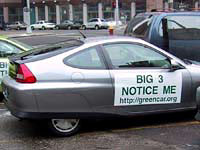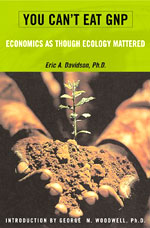Climate Technology
All Stories
-
Perrier didn't reckon on an angry citizenry when it looked to expand into the Midwest
Escape to Wisconsin. Play in our lakes, fish our rivers, and cavort in the famously kitschy water parks of Wisconsin Dells. Just don’t try to take a drop of it home with you. Ninety-nine bottles of water on the wall. This, at least, is the stern message being sent by thousands of Wisconsin citizens to […]
-
The Arctic Refuge could become Bush's gays-in-the-military
California’s energy crisis has become a national Rorschach test, saying more about the viewer than about the ink blot. President Bush is a special case: He looks at the deregulation crisis and sees the need to drill for oil in Alaska’s Arctic National Wildlife Refuge. Caribou-hoo-hoo. Photo: USFWS. Of course, given the number of oil […]
-
Dubya's pro-industry policies aren't only about the money
Consider the rules. No, not the rules of love, but the rules of government — specifically those rules of the previous administration suspended for 60 days on the first day of the present administration under an order issued by President George W. Bush’s chief of staff, Andrew Card. Rules of the game. No big deal. […]
-
Meet the Bush team, brought to you by Exxon
To an extraordinary degree, the administration assembled by George W. Bush is made up of men and women with experience in the automobile and oil industries. With the energy crisis in California, such energy expertise at the helm, it would seem, must be a good thing. Would that it were so. In reality, the Bush […]
-
The Big Three are talking a good game, but reality does not match the rhetoric
Judging by the media hype over Ford’s and General Motors’ early January announcements on “hybrid” vehicles at the North American International Auto Show, one would think that automakers have seen the light and are finally matching their professed concern for the environment with deeds. Hybrid cars deliver better fuel efficiency by using two power sources […]
-
Deregulation in California didn't help consumers, or the environment
As blackouts roll through California, the New Hampshire Supreme Court cleared the way for electrical restructuring, while a Vermont utility assured legislators that what is happening out West can’t happen here. Why not? The powers that don’t have to be. As I hear people try to explain California’s electricity problem, I wonder whether anyone really […]
-
Reading tea leaves for the environment
Every month I get a kind of Reader’s Digest for people interested in the future. It’s called Future Survey, issued by the World Future Society. Each month it contains about 50 extended summaries of recent publications about the paths — economic, environmental, social — we seem to be following. The November 2000 issue, for example, […]
-
A review of You Can't Eat GNP
"The more money we spend, according to the GNP ... the better off we are," explains Eric Davidson in You Can't Eat GNP. The Gross National Product, or GNP in common parlance, is the cumulative value of products and services created and traded by a nation, and the traditional measure of economic well-being. Yet in the past decade or so, the flaws in this measuring system have become increasingly clear to a growing number of economists, social scientists, and other observers. As Davidson learned during his time as a Peace Corps volunteer in Zaire, not only does the GNP fail to account for the state of a country's health-care, education, and welfare systems -- it also fails to recognize the overall and long-term costs, environmental and otherwise, of producing goods and services.
-
A look back at Al Gore's 1992 opus on the environment
How many environmentalists have actually read Earth in the Balance? Very few, I'm willing to wager.
The truth is that until recently, I myself felt qualified to pontificate on Al Gore's environmental beliefs and, yes, occasionally question whether he'd lived up to them, even though I hadn't read more than a few excerpts from the book. Well, that age of innocence is over.
-
One man taxes his way to a healthy relationship with the earth
Dev Carey is a tall, handsome man with a Ph.D. in ecology. He can swing dance like a pro, identify every plant in the meadow outside his house, and talk nervous youths into rappelling off cliffs. He can do many things, but one thing he can’t do is separate himself from the morality of any […]





